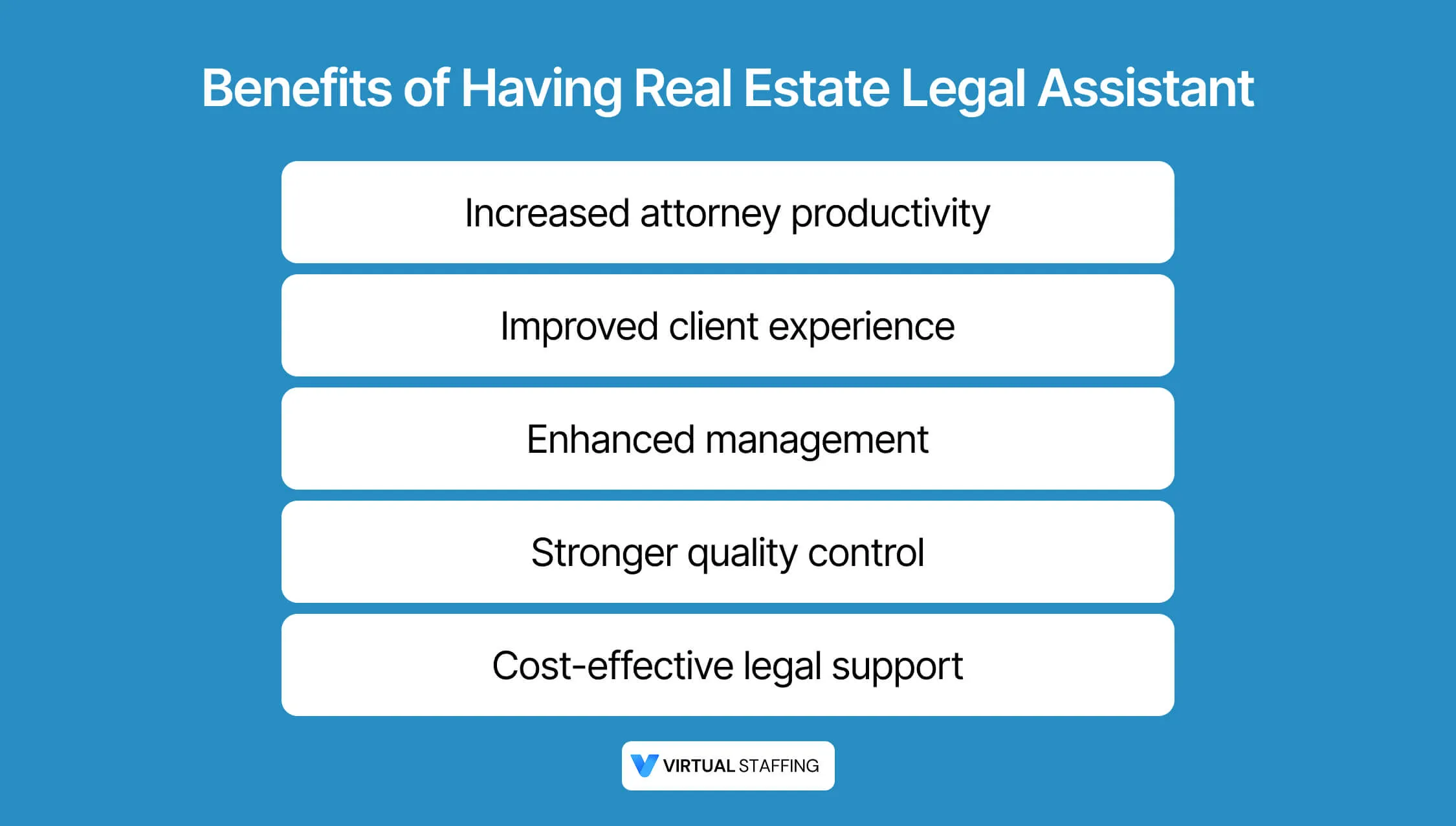The real estate industry in the United States moves fast, with an annual growth rate of 3.31% and a projected market value of USD 155.60 trillion by 2029. With this surging demand for properties, every transaction needs to be handled carefully by legal professionals to avoid complications.
If you're a real estate attorney or a law firm specializing in real estate law, you know that managing residential closings or complex commercial deals can quickly become overwhelming, as they require meticulous attention to detail and extensive documentation.
That’s where a real estate legal assistant becomes invaluable. They handle essential support and administrative tasks that allow attorneys to focus on core legal work. From their roles and skills to salary insights, this guide will cover everything you need to know about how real estate legal assistants can strengthen your practice.
What Is a Real Estate Legal Assistant?
A real estate legal assistant is a legal professional who specializes in providing support to attorneys and law firms that handle real estate matters and transactions. They assist with real estate documentation, zoning regulations, title searches, and closing procedures. These professionals possess a strong understanding of real estate legal processes and help attorneys manage real estate transactions efficiently.
Real estate legal assistants work closely with attorneys to handle administrative and time-consuming routine tasks involved in real estate practice. According to the 2025 U.S. Foreclosure Market Report, there were a total of 101,513 U.S. properties with foreclosure filings, reflecting just one of the many complex issues that can arise in real estate. This highlights how firms can greatly benefit from the support of real estate legal assistants.
What Does a Real Estate Legal Assistant Do?
As discussed, the primary purpose of a real estate legal assistant is to reduce the administrative burden on attorneys. Their ability to support attorneys through every phase of real estate transactions is essential for ensuring smooth operations within a law practice.
Here’s are typical real estate legal assistants tasks:
- Preparing legal documents - Real estate legal assistants draft, proofread, and organize essential documents such as purchase agreements, deeds, mortgages, leases, and closing statements.
- Conducting title searches - They review property records to verify ownership history and examine title documents to identify any liens, encumbrances, or issues that could affect the transaction.
- Legal research - On behalf of attorneys, real estate legal assistants research zoning regulations, local ordinances, and case law that may affect property transactions, enabling attorneys to provide accurate legal guidance to clients.
- Scheduling and coordinating closings - They arrange closing appointments, prepare closing packages, coordinate with all parties involved, and ensure that all required documents are properly executed and recorded.
- Managing communication - Real estate legal assistants serve as a point of contact for clients, responding to inquiries, providing updates on transactions, and explaining procedures. Their support helps attorneys maintain responsiveness throughout all stages of a case.
- Facilitating due diligence - Real estate legal assistants help manage the due diligence process for both residential and commercial transactions, flagging any potential issues that require attorney attention.
- Processing recordings and filings - They handle the submission of documents to county recorders’ offices, track recording status, and ensure proper filing with relevant authorities.
What Is the Salary for a Real Estate Legal Assistant?

A real estate legal assistant in the United States typically earns between $57,000 and $89,000 per year, with the national average salary around $71,000, according to data from Glassdoor. This shows that legal assistants who specialize in real estate tend to earn higher salaries than general legal assistants, who average about $58,000 per year.
While these figures provide a general idea of the average salary for real estate legal assistants, actual compensation can vary based on several factors, including experience, location, employer type, and specialization.
Salaries in metropolitan areas with high real estate activity are typically higher to attract skilled candidates. Additionally, professionals working in commercial real estate often receive higher compensation than those focused on residential real estate.
How to Become a Real Estate Legal Assistant
Degree requirements
Most real estate legal assistant positions require at least an associate degree or a bachelor’s degree in a related field. Educational programs for aspiring legal assistants typically include coursework in legal research, civil procedure, contract law, and, ideally, specialized classes in real estate law and property transactions.
Some professionals enter the field with only a high school diploma and gain experience through on-the-job training in law firms. However, this path is becoming less common as the profession continues to professionalize and the job market becomes more competitive.
Certification requirements
To strengthen their qualifications and stand out in the job market, many real estate legal assistants pursue certifications through professional organizations such as the National Association of Legal Assistants (NALA) or the National Federation of Paralegal Associations (NFPA). These credentials demonstrate a commitment to professional development and the legal field.
Some professionals also earn specialized certifications through American Bar Association (ABA)-approved programs in real estate law. Most certification programs require continuing legal education (CLE) credits to maintain credentials, helping professionals stay current with legal developments and best practices in the real estate industry.
Benefits of Having a Real Estate Legal Assistant

Now that we understand what a real estate legal assistant is and what they do, here’s how bringing one onto your team can benefit your practice:
- Increased attorney productivity. They handle routine legal documents and administrative tasks, so attorneys can dedicate more time to client services, negotiations, and legal strategies.
- Improved client experience. Clients stay informed and receive prompt responses to inquiries, along with regular updates throughout the entire transaction process.
- Enhanced management. With a legal assistant tracking deadlines and managing document flow, firms can avoid missed deadlines and ensure smoother closings.
- Stronger quality control. They perform thorough document review and cross-checking to catch potential issues early, reducing malpractice risk and ensuring compliance.
- Cost-effective legal support. Billing an assistant’s time for administrative work is far more cost-effective than using an attorney’s billable hours, ultimately increasing the profitability of each transaction.
Qualifications to Consider When Hiring One
When assessing candidates to join your legal team, it’s important to look for professionals who bring more than just educational credentials. The ideal candidate should be reliable and capable of serving as an effective extension and representation of your practice.
Consider the following qualities when hiring a real estate legal assistant:
- Organization: Real estate legal assistants often juggle multiple responsibilities. Look for candidates who can manage a high volume of legal documents, maintain organized files, and meet multiple case deadlines.
- Legal knowledge: This is non-negotiable, candidates must have an understanding of real estate terminology, procedures, and core legal principles.
- Attention to detail: Even small errors in legal documents can derail entire transactions. A strong eye for accuracy is essential.
- Tech savviness: With most legal practices relying on digital tools to streamline operations, a legal assistant who is comfortable using legal software and technology platforms brings an advantage.
- Communication skills: Legal assistants must communicate clearly in both writing and speech, as they interact daily with clients, opposing counsel, and other parties involved.
- Problem solving: Real estate legal assistants often work under pressure. Candidates who demonstrate resourcefulness and the ability to find effective solutions when challenges arise will excel in this role.
How to Hire a Real Estate Legal Assistant
There are several ways to hire a real estate legal assistant. To build an effective legal team, consider the following approaches based on your firm’s needs, budget, and resources:
1. Find candidates directly
The traditional route involves posting job listings on major job boards or legal-specific platforms to source the right candidate. However, this method requires a significant investment of time and resources for screening, interviewing, and onboarding.
2. Work with an outsourcing company
Outsourcing companies provide access to trained real estate legal assistants who can handle administrative and transactional tasks for your practice. While this approach is often faster than hiring directly, the tradeoff is typically less control over employment terms, as these assistants remain employees of the outsourcing provider.
3. Hire a virtual assistant
For firms seeking greater flexibility and control, hiring a virtual real estate legal assistant can be an excellent option. Companies such as Virtual Staffing offer a pool of professionals who specialize in supporting real estate attorneys remotely.
These assistants work exclusively for your firm and can significantly reduce overhead costs, since they provide their own workspace and equipment. However, virtual arrangements require clear communication systems to maintain the same level of collaboration you’d expect from on-site assistants.

Final Notes
Far more than administrative support, real estate legal assistants are specialized professionals who keep your practice running efficiently. By understanding their capabilities and the value they bring, attorneys can better evaluate their staffing needs and make informed decisions when building their teams.
As the real estate market continues to evolve with new technologies and regulations, having a skilled legal assistant becomes increasingly valuable for attorneys managing growing workloads and time-consuming administrative tasks.
Take the time to clearly define your needs, set realistic expectations, and hire a professional with expertise in your specific area of real estate practice. Your real estate legal assistant can become a trusted partner in your practice's success, and the effort you invest in finding and developing the right person will pay dividends for years to come.



.webp)
.webp)
